
Greta Thunberg and the #climatestrike are shaping the climate debate
With the 16-year-old climate activist Greta Thunberg as their figurehead, thousands of young people have taken to the streets and social media in the past couple of months to demand an end to politicians' climate inaction. These youngsters have been successful, both through their online and offline activities, in sparking debate and mainstreaming the extending of the limits of the 'sayable' in the climate change discussion.
#climatestrike
In August 2018, the Swedish teenager Greta Thunberg went on school strike. Refusing to go to school, she would instead sit outside the Swedish parliament building with a Skolstrejk för klimatet ('School strike for the climate') sign.
What started as the lone action of a Stockholm teenager against politicians' inaction towards climate change has since become an international phenomenon. There have been strikes in for instance Germany, Belgium, Australia, Switzerland, the US, Canada, Finland, Denmark, Japan, and the UK. Huge numbers of young people have attended climate marches; in Belgium alone, tens of thousands have continued to skip school for weeks to take to the streets. As this column is published, Dutch students are embarking on their first school strike.
Thunberg herself keeps striking every Friday. But now it's with thousands of others, in actions visible on social media through hashtags such as #climatestrike, #schoolstrike4climate, and #fridaysforfuture.
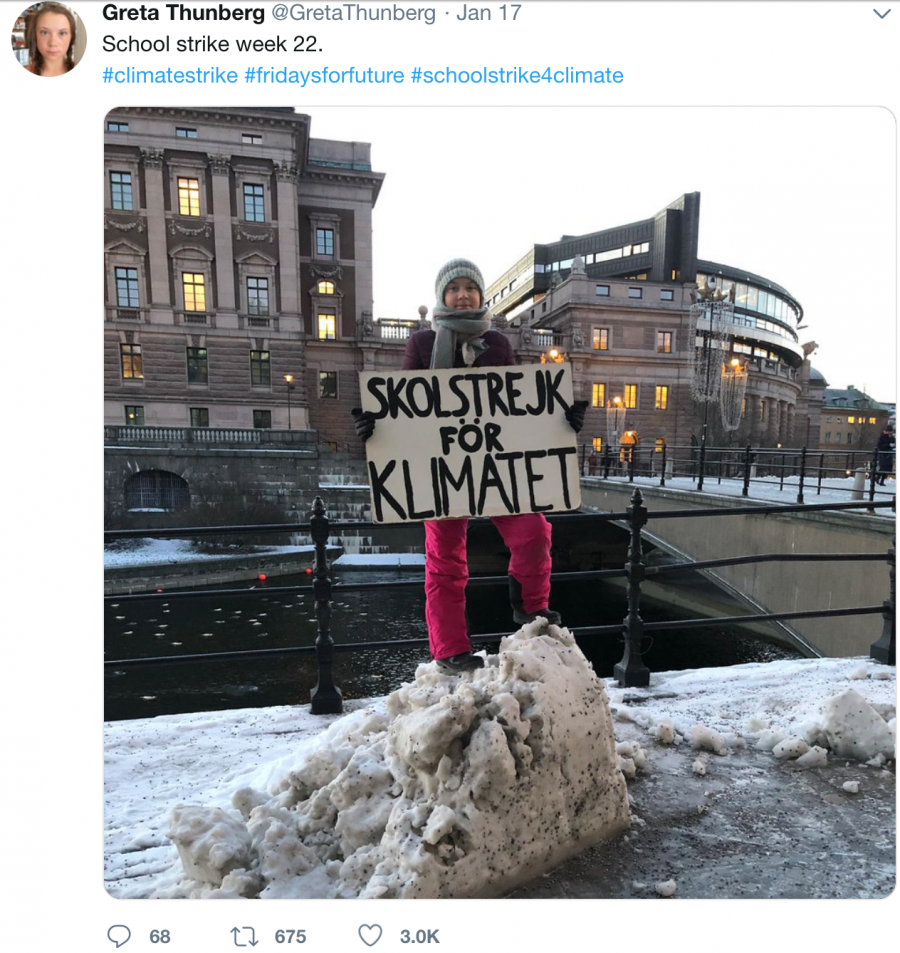
Greta Thunberg striking
In the months since she started her school strike, Thunberg has become a very prominent media figure. In a November 2018 opinion article in The Guardian, she explained: "Some say I should be in school. But why should any young person be made to study for a future when no one is doing enough to save that future? What is the point of learning facts when the most important facts given by the finest scientists are ignored by our politicians?"
In December 2018, Thunberg became even more widely known, as she addressed the United Nations climate change summit. Many are now listening to what she has to say. Comparisons have been drawn to another Swedish young female powerhouse with pigtails, Pippi Longstocking. A small minority of the conspiratorially inclined has labelled her as a little girl who's just a puppet for the 'climate change lobby'; claims that Thunberg recently addressed in a Facebook post. Similar claims of a conspiracy behind the climate strikes have also surfaced in Belgium, where the Flemish environment minister Joke Schauvliege resigned earlier this week after having claimed that the huge protests in the country were a “set-up” and “more than spontaneous actions of solidarity”.
Among the few who have come out with criticisms of Thunberg's actions and the striking she has inspired elsewhere is also the Australian Prime Minister Scott Morrison who - apparently appalled by the idea of young people who can think for themselves - said "We don't support our schools being turned into parliaments. What we want is more learning in schools and less activism in schools."
Thunberg responded on Instagram, with a simple message both to the Prime Minister and Australian youth:
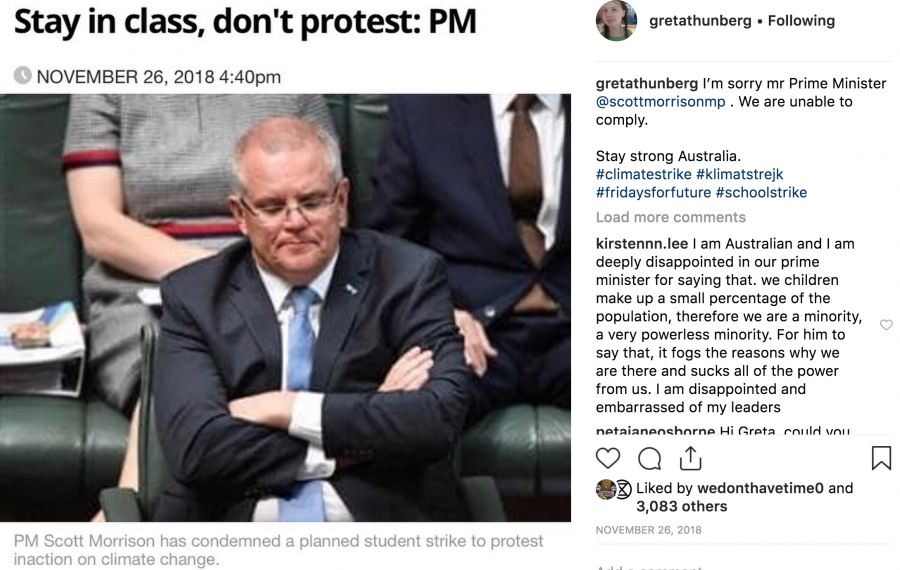
Greta Thunberg responds to the Australian PM
"I am here to say our house is on fire"
One of Thunberg's most visible media appearances was at the annual World Economic Forum meeting in Davos in January. While those attending were criticised for their hypocrisy for flying in in private jets to talk about climate, Thunberg, putting her money where her mouth is, made a 32-hour journey to the meeting from Sweden by train.
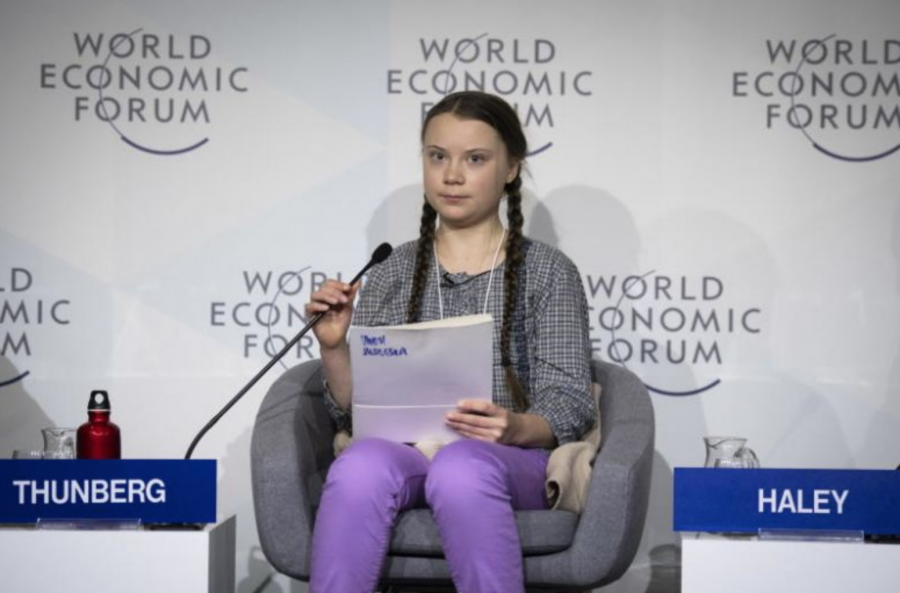
Greta Thunberg in Davos
In Davos, Thunberg appeared at a lunch featuring bankers and investors, superstars Bono and Will.i.am, and the former Goldman Sachs president Gary Cohn, among others. The video of the event - of Thunberg roasting the billionaires - was gleefully shared by many on social media. "Some people say that the climate crisis is something that we will have created, but that is not true", she said, "because if everyone is guilty then no one is to blame. And someone is to blame. Some people, some companies, some decision-makers in particular", she continued, "have known exactly what priceless values they have been sacrificing to continue making unimaginable amounts of money. And I think many of you here today belong to that group of people."
After an awkward silence, Bono seems to be the one to save the billionaires' day by starting to applaud:
Thunberg didn't mince her words in her other Davos appearances either. "Now is not the time for speaking politely or focusing on what we can or cannot say", she said; "Now is the time to speak clearly, no matter how uncomfortable and unprofitable that my be." She talked about the necessity of equity, about climate justice, and how "financial success has become with an unthinkable price tag". Thunberg ended her speech in Davos with a message to adults: "Adults keep saying: 'We owe it to the young people to give them hope'. But I don't want your hope. I don't want you to be hopeful. I want you to panic. I want you to feel the fear that I feel every day. And then I want you to act. I want you to act as you would in a crisis. I want you to act as if our house is on fire. Because it is."
What is also remarkable about Thunberg and the #climatestrike is that it has been steering the discussion around climate change away from mere individualised solutions towards questions of systemic injustice
Apart from her powerful speeches, in our digital culture Thunberg's and others' activism would of course not be complete without social media. For a steadily growing following on Twitter, Facebook and Instagram, Thunberg shares climate facts and news about school strikers all over the world. The reactions to her posts include parents' stories of how their children have also been inspired to take action, reports from other school children about how they're taking part, and words of thanks and encouragement to Greta: "You are a hero and a beautiful human"; "You are an inspiration"; "The world needs more Gretas".
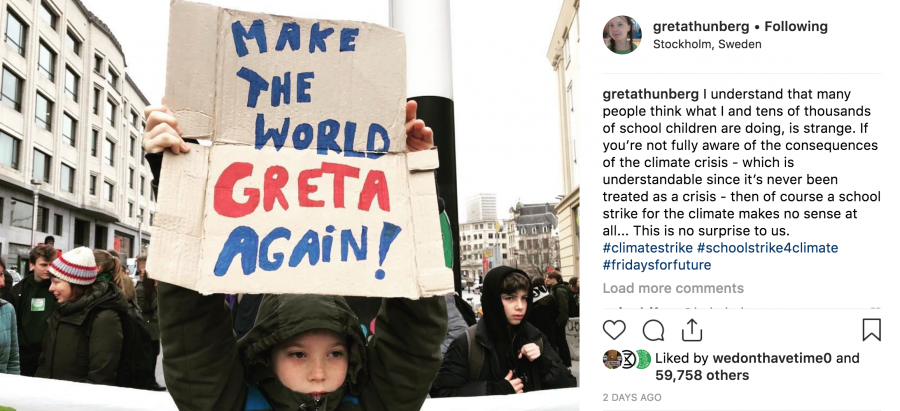
Make the world Greta again
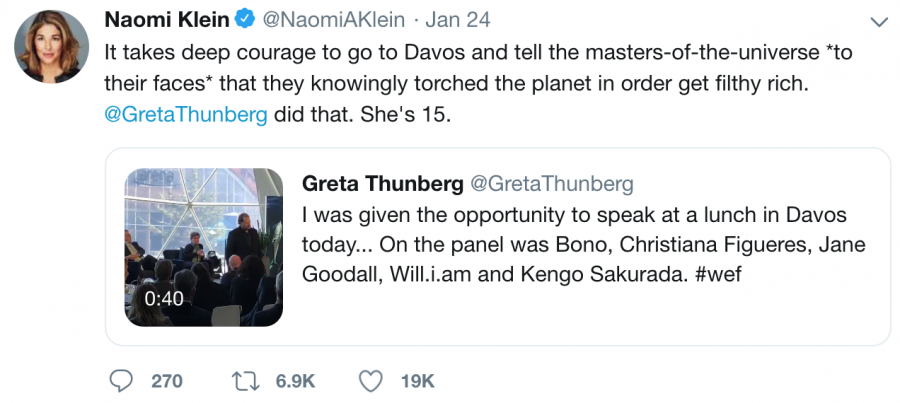
Naomi Klein on Greta Thunberg's Davos appearance
Thunberg and her fellow strikers have managed to turn ideas that seemed for many only a short while ago too difficult and depressing to deliberate into issues of everyday engagament and debate for thousands and thousands of people. This is remarkable, as Thunberg and the school strikers don't have a very pleasant message to deliver - nobody wants to hear that their house is on fire.
What is also remarkable about Thunberg and the #climatestrike is that it has been steering the discussion around climate change away from mere individualised solutions towards questions of systemic injustice, and the way in which the most vulnerable are the first ones to pay the price when financial gain is prioritised over the future of young people.
Greta Thunberg, #climatestrike and the climate debate
What Greta Thunberg and the #climatestrike actions online and offline are thus managing to achieve is not only increased visibility to the issue of climate change, but also changing the parameters of the debate. As Naomi Klein stated in her This Changes Everything (2014: 19), "because of our decades of collective denial, no gradual, incremental options are now available to us. Gentle tweaks to the status quo [have] stopped being a climate option". That is, radical changes are now necessary to avoid disaster. This is also what Thunberg says, and what she has successfully put on the agenda. "If solutions within the system are so impossible to find, then maybe we should change the system itself", she said at the UN climate summit.
"Not everything that is faced can be changed; but nothing can be changed until it is faced", as James Baldwin (1962) put it. The #climatestrike is proving very effective in forcing us to face the reality of climate change and the 'unthinkable price tag' that comes with the profit-above-anything-else thinking. Whether it's through hashtags, strike selfies or street protest, let's hope that more people will be - as Thunberg put it in her Instagram response to the Australian Prime Minister - 'unable to comply'.
References
Baldwin, James 1962. As much truth as one can bear. In The cross of redemption. Uncollected writings. New York: Pantheon Books.
Klein, Naomi 2014. This changes everything. Capitalism vs the climate. Toronto: Knopf Canada.